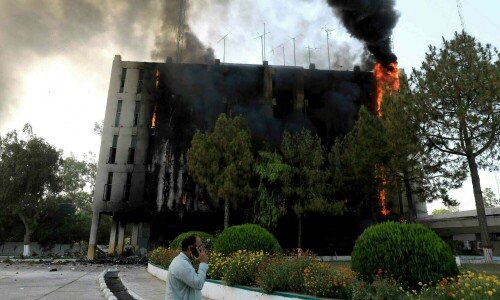RAWALPINDI: The Lahore High Court’s (LHC) Rawalpindi bench has ruled against retrospective application of a section of the Income Tax Ordinance 2001 that relates to concealment of taxable income.
The LHC bench comprising Justice Sajid M. Sethi and Justice Jawad Hassan noted that the application of Section 111(d) of the ordinance in the tax reference in hand was ‘unlawful’.
Initially, the court formulated the question that when it is admitted or determined that income has been concealed by suppressing the sales can the evaded tax be allowed to be kept as a gift by the taxpayer on the ground that wrong provision of law has been mentioned i.e. Section 111(1)(d)(i).
The court was earlier informed that a show cause notice was issued to the respondent-taxpayer to explain the nature and source of credit entries based on suppression of sales/tax evasion during a desk audit, on account of certain discrepancies found between the bank statement and statement of final taxation for the period in question.
Although the respondent filed reply to the show cause notice, the same was found ‘unsatisfactory’ that further led to amendment of the assessment and subsequent addition of Rs228 million under Section 111(1)(d) of the ordinance and total income was assessed at around Rs233m involving tax demand of Rs57m.
Feeling disgruntled, the respondent filed an appeal before Inland Revenue Commissioner. It was later disposed of vide order dated Nov 17, 2016 with the observation that Section 111(1)(d) as well as general rate of tax on the income of taxpayer without altering his status under the minimum tax regime under Section 113A declared under Section 115(4) of the ordinance, was wrongly applied by the assessing officer.
However, the appellate tribunal allowed the appeal of the taxpayer.
FBR’s legal adviser submitted that despite the fact that income has been concealed by suppressing the sales, the appeal of respondent-taxpayer was allowed by learned appellate tribunal without any lawful justification, on the ground that the provision of law i.e. Section 111(1)(d)(i) was not attracted.
He admitted that the show cause notice should have been issued under Section 111(1)(b), but said Section 111(1)(d) was ‘erroneously’ quoted.
The bench observed that Section 111(1)(d) was inserted through the Finance Act, 2011 with prospective effect and came into force with effect from July 1, 2011, adding that the matter pertains to the tax year 2010, thus, no retrospectivity can be given to it.
“As a basic principle of interpretation of statutes, tax statutes operative prospectively unless clearly indicated by the legislature, therefore, retrospectivity cannot be presumed,” the court ruled.
Published in Dawn, September 26th, 2024














































